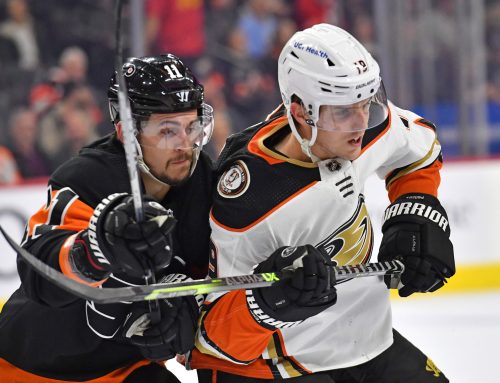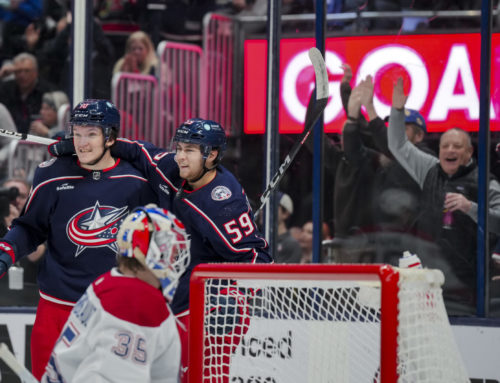For anyone looking for more information from around the sports world, as it relates to COVID-19 and the impact on players, the business, or whatever else, TSN – a major sports network in Canada – is starting an In Depth series that focuses solely on how this is affecting various aspects of the sports world. I know a lot of people would rather not see it or listen to it, so I'll just post the link here rather than post the entire video itself.
*
Our own Alex MacLean has been churning out the excellent 'Capped' columns here at Dobber Hockey, and his last couple have focused on the impending Seattle expansion. Readers can check out those articles as well as his previous work here.
I'm bringing up those columns for personal reasons, though. More specifically, one name that stuck out to me when Alex was discussing Eastern Conference teams: Erik Cernak. I think Cernak could be one of the top multi-cat defence options in the league in a couple years. Allow me to explain.
Through his brief career, which has spanned just 125 regular season games through his age-22 season, he's played a shade over 19 minutes a night (19:05 actually). In his time in the NHL, he ranks inside the top-third of the NHL by individual shot attempts generated. He's just under 1.9 shots per game with this rate, meaning if he does find himself in Seattle a couple years from now, and hopefully playing 21-22 minutes a night, he'll easily pass 2.0 shots per game, kind of a benchmark for defencemen.
The shot-blocking component of Cernak's arsenal isn't as stout as the shooting, but it's not nothing, either. His shot blocking rates at all strengths are about the middle of the league over these last two years, but significantly better on the penalty kill. As long as he keeps getting those PK minutes when (IF) he's in Seattle, there's no reason to think he won't sit around 125 blocks year after year.
And then there are the hits, and boy does he hit. Over the last couple years, he ranks inside the 90th percentile in hits per 60 minutes at all strengths. Despite being 111th in the league among defencemen in ice time in that span, he's eighth in hits, and he only played 58 games in 2018-19. He put up more hits than Jeff Petry, another great multi-cate guy, in 28 fewer games. He does this, as a reminder, playing 19 minutes a night. What is he going to do when he's playing well over 20 minutes a night?
Not hyperbole: Cernak has averaged nearly three hits per game in his career – 2.96, to be exact. So here we have a guy playing 19 minutes a game, posting nearly two shots, 1.5 blocks, and three hits per game for his career. He's just 22 years old, and there's the possibility that he's going to be in an environment where he's playing 22, 23, 25 minutes a night, what are those numbers going to look like? I don't want to assume linear growth, but it's hard to imagine it won't help in some regard.
And it's not as if Cernak has been reliant on point production to date, with just 36 points in 125 games. People will say that leaving Tampa Bay for an expansion franchise is a downgrade for point production, and it is, but I'll trade that off for a lot more minutes from a guy with the fantasy profile of Cernak. Maybe this summer will be the time to buy in on him, considering how low his point production was in 2019-20.
*
Not for nothing, but Marcus Pettersson fits this bill as well but I don't imagine that the Penguins will be letting him go. All the same, Pettersson's multi-cat performances are crazy-good, and I hope that he gets more ice time in coming seasons. He, like Cernak, was also under 20 minutes a night in 2019-20, and he, like Cernak, could be a monster if he plays 21-22 minutes. PLEASE, SULLIVAN.
*
When looking up the stats for the defencemen, I started looking around at other stats and looking at the individual points percentage (IPP) list. IPP is simply the percentage of goals on which a player accumulates a point. If a player is on the ice for 100 goals and has an 80 percent IPP, that means they have accumulated 80 points. Easy peasy, right?
Two names stood out to me among the 138 defencemen with at least 2000 minutes played at all strengths over the last two seasons: Rasmus Dahlin and Filip Hronek. They are both among the top-10 defencemen by IPP at all strengths over the last two years. The top-10 looks like this:
- Roman Josi – 56.8 percent
- Brent Burns – 55.4
- Torey Krug – 55.1
- John Klingberg – 52.4
- John Carlson – 52.2 percent
- Erik Karlsson – 51.8 percent
- Rasmus Dahlin – 51.5 percent
- Filip Hronek – 51.4 percent
- Shea Theodore – 50.3 percent
- Drew Doughty – 50 percent
When looking at this list, it's a veritable who's-who of elite fantasy defencemen over the last half-decade. I don't want to exclaim that Dahlin is the next Josi or that Hronek is the next Doughty – from a fantasy perspective – but it's hard not to be excited about them. Even if we think they're overheating a bit from just two seasons, the list of defencemen from 11-20 doesn't really decline much in fantasy prowess: Tony DeAngelo, Dougie Hamilton, Tyson Barrie, Keith Yandle, Kevin Shattenkirk, Mattias Ekholm, Zach Werenski, Mark Giordano, Erik Gustafsson, and Thomas Chabot. When looking at that entire top-20 list, and figuring that even if Dahlin and Hronek were to slide under 50 percent for a little while that they'll still be in the same range as some of the elite blue liners in the fantasy game, there is a lot of reason to be excited.
Of course, these are two defencemen on teams largely barren of top-end defensive talent, and how an influx of talent could affect those guys. One example is if Moritz Seider gets to the NHL and starts proving himself elite as a puck-mover and shot generator, how does that effect Hronek's IPP? It's for that reason I'm more worried about Hronek than Dahlin.
There's obviously a lot more that goes into this than just pointing at an IPP, such as the influx of talent just mentioned. All the same, that these two are finding themselves involved in so many goals is a good sign early on.
*
Also while looking through stats for defencemen, I noticed this: Miro Heiskanen is top-10 among defencemen by individual expected goals at all strengths over the last two years. That's a raw total, not a rate total. The top-10: Josi, Burns, Alex Pietrangelo, Dougie Hamilton, Werenski, Carlson, Theodore, Kris Letang, and Victor Hedman. That is also a who's-who of fantasy greatness among rearguards. (Even if we move to just a rate stat, Heiskanen drops a bit but he's still tied for 11th among 138 defencemen.)
Before the season, I said I was wary of Heiskanen's ranking because he wasn't going to be PP1 and the team played too defensively. Now, the latter wasn't the case until Jim Montgomery was fired, but he's not a guy who will rack up hits or blocked shots. He's fine for multi-cat leagues, but certainly not a multi-cat stud by any stretch.
All the same, Heiskanen has a lot of very good data points showing his offensive prowess, and individual expected goals is certainly one of them. He has an exciting future.
*
One last stat to point out while I was looking through all this: out of the 138 defencemen with at least 2000 minutes at all strengths over the last two years, Dunn is ninth in shot rate, ahead of names like Morgan Rielly, Mark Giordano, and Matt Dumba. The problem, of course, is that Dunn gets a lot fewer minutes than the guys anywhere around him on this list. Most of the guys with shot rates like him player 21, 22, 23 or more minutes a night. Dunn has three seasons under his belt and peaked at 17:32 per game in 2018-19. That fell more than a minute in 2019-20.
That's the whole problem with Dunn. I really do think he's a top-end puck-moving defencemen, but there are a lot of good defencemen on the roster and they don't seem to want to give him heavy minutes. It reminds me of Krug playing 17-19 minutes through his first couple seasons before getting to the 21-minute range. It's worth noting that Dunn is 23 years old. He still has some growth to do.
I think Dunn can honestly be a 50-point defenceman on a team that focuses on offence and where he gets regular PP minutes. I'm not sure either of those things will happen in St. Louis anytime soon. Should he happen to be one of the expansion draft casualties, however, there could be a lot of upside in a new locale.





 PHI
PHI TOR
TOR ANA
ANA NYI
NYI BUF
BUF CGY
CGY VAN
VAN CAR
CAR STL
STL MTL
MTL EDM
EDM
